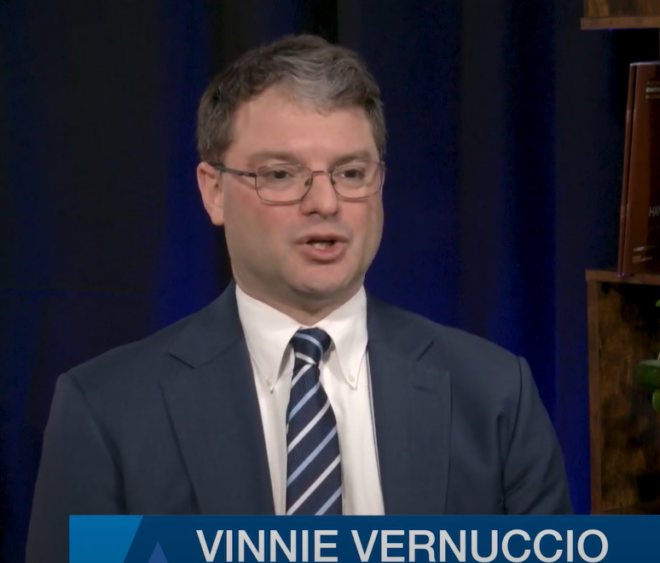Posts tagged Vinnie Vernuccio

Has Pushback to Full of ‘S’ Labor Unions Finally Arrived?
June 10, 2024 // Written by I4AW’s Sam Adolphsen and F. Vincent Vernuccio, the study warns that the initial “Environmental” focus of ESG is being supplanted by labor leaders, who are focusing on the leftist acronym’s “social” component in order to intimidate companies and force membership growth: With help from the whole of Biden’s big government, Big Labor is replicating the ESG strategies used by environmentalists and other activists. These groups aim to cajole fossil fuel-producing companies and other businesses they consider socially unacceptable into abandoning profitable business ventures. The tactics of the Big Labor plan call for hijacking the shareholder resolution process through proxy voting and shareholder activism to force pro-union policies. Unlike typical shareholder proposals, those supported by Big Labor do not seek to advance shareholder value. Instead, they seek to increase union membership and strengthen Big Labor’s power.
Florida sets the stage for labor reforms
May 18, 2023 // Whenever a union falls below 60 percent of membership in a collective-bargaining unit, public employees will have the right to an election. They can vote to keep the union at their workplace, replace it with a different union, or remove union presence altogether. A Florida-senate bill analysis found that at least 40 local teachers’ unions in Florida were below the 60 percent threshold, and a 2012 Heritage study showed that a mere 1 percent of teachers in Florida’s largest schools actually voted for their unions, meaning current workers may be ready to revisit previous generations’ decisions.
DeSantis touts ‘Teacher Bill of Rights’ as he signs 5 education bills Tuesday in Miami
May 11, 2023 // “This bill gives Florida teachers a voice and a choice,” said Senior Labor Policy Advisor Vincent Vernuccio. “Teachers and other public workers will know their rights. They’ll know exactly how much union membership costs them each year. And they’ll know that, if their union isn’t serving them, they can do something about it.” Workers for Opportunity said the legislation drew from its proposed reforms giving employees more control over their paychecks and union representation.
In NC, no worker has to join a union. My constitutional amendment will keep it that way.
April 21, 2023 // The ability to work freely without coercion is an integral part of our workforce ethos in North Carolina. We have been a right-to-work state since 1947, and the facts show that this status has benefited our workers and helped grow our economy. Right-to-work refers to the ability of workers to choose whether or not they want to join and pay dues to a labor union. In other words, workers are not coerced into joining a union by being required to pay dues as a condition of employment. Instead, people have the ability to choose whether or not they wish to join a union when seeking a job in which the employer is affiliated with a union. In the words of national labor expert F. Vincent Vernuccio, senior policy advisor with Workers for Opportunity, “Right-to-work simply means a union cannot get a worker fired for not paying them.”
Tennessee Senate Committee Tackles Union Coercion Commerce and Labor Committee Passes SB 650 to Secure Workers’ Right to a Secret-Ballot Union Election
March 22, 2023 // Even with the constitutional right-to-work, Tennessee employees can still face union coercion. Card check organizing takes away employees' right to a secret ballot in unionization elections and subjects workers to intimidation, coercion and deception by union leaders. To get these cards, unions can visit workers at their homes or repeatedly call their personal cell phones. Tennessee taxpayers should never have to fund union coercion, nor should companies getting economic incentives need to worry about unions strong-arming them or their employees. Just like Tennessee voters enjoy the right to privacy at the ballot box, Tennessee workers deserve the right to decide union representation through a private, protected ballot. The passage of SB 650 would ensure that, in workplaces that accept state economic incentives in the future, workers have that opportunity.
Institute for the American Worker Head Vinnie Vernuccio: Tennessee Is Leading the Way with Right-to-Work 2.0
March 15, 2023 // You made it a constitutional right, so it can’t be repealed like Michigan. Now you’re going even further, you’re doing right to work 2.0 by making sure employees of companies that get economic incentives, the secret ballot for them in unionization elections is protected. And your governor is also out there, Governor Lee is protecting teachers’ paychecks, not only giving them raises, but also making sure they get their full paycheck. And part of it isn’t siphoned off and given to teachers’ unions.
Florida Republicans introduce bills prohibiting paycheck deductions for public-sector union dues
March 14, 2023 // Vincent Vernuccio, a representative for the Mackinac Center’s Workers for Opportunity initiative, said, “[SB 256] is about transparency, accountability, good bookkeeping, and democracy. … This bill is about the rights of public employees: making sure they’re informed and they can exercise them.” Freedom Foundation representative Rusty Brown said, “There’s nothing in this bill that curtails organizing or collective bargaining for wages, benefits, or working conditions, which is what a union should be doing. And when you have a union whose membership is half [the people they represent] … then that could be indicative of a problem. … [This bill] gives the employees represented by the union the opportunity to vote … if they would like to continue allowing that union to represent them.”

Video: ALEC’s Labor of Love: A History of Championing Worker Freedom
March 10, 2023 // Today, ALEC debuts its first episode, “Worker Freedom,” in our 50th anniversary video series. The episode features ALEC champions Scott Walker (45th Governor of Wisconsin), Matt Hall (Michigan House Minority Leader and ALEC Board of Directors Member), and Vinnie Vernuccio (Senior Fellow, Mackinac Center), discussing ALEC’s pivotal role in securing Worker Freedom policy wins across the states. In some states, private sector workers can be forced to join, leave, or pay fees to a union as job requirement. The Right-to-Work Act, which ALEC task forces approved as a model policy, provides a solution to this issue. It prevents private employers from requiring or banning union membership (or fees) as conditions for employment, giving workers in Right-to-Work states a guaranteed right to support a union or not to support a union without this choice affecting their hiring or job security.

Department of Labor Rule – Coalition Letter
July 22, 2022 // The January 7, 2021 DOL rule has provided clarity to the decades-old economic realities test for the modern workforce, helping to apply determinations in light of the different types of work and technologies used to work and connect with customers today. Instead of removing this clear and sensible standard and attempting to diminish or eliminate independent contracting, we urge you to preserve paths to self-employment that allow tens of millions of working Americans, parents of children with special needs, workers seeking career changes, disabled workers and workers caring for disabled family members, and entrepreneurs growing small businesses of their own to pursue work on their own terms. Brent Wm. Gardner, Brandon Arnold, Grover Norquist, Michael J. Lotito, Greg Sindelar, Krisztina Pusok, Ph. D., The American Consumer, American Legislative Exchange Council, Lisa B. Nelson, Center for Freedom and Prosperity, Andrew F. Quinlan, Robert Fellner, Heather R. Higgins, Independent Women's Voice, Bethany Marcum, Alaska Policy Forum, Mike Stenhouse, Mike Hruby, New Jobs America, Paul Gessing, Rio Grande Foundation, Seton Motley, Less Government, Robert Alt, Steve Delie, Brian Minnich, Daniel Erspamer, Pelican Institute, Eric Peterson, Pelican Center for Technology and Innovation, Randy Hicks, Georgia Center for Opportunity, Alliance for Opportunity, Jeffrey Mazzella, Center for Individual Freedom, Douglas Carswell, Mississippi Center for Public Policy, David Williams, Taxpayers Protection Alliance, Ryan Ellis, Center for a Free Economy, Phil Kerpen, American Commitment, James Taylor, The Heartland Institute, Adam Brandon, FreedomWorks, Elaine Parker, Job Creators Network Foundation, Brandon Dutcher, Oklahoma Council of Public Affairs, Thomas A. Schatz, Citizens Against Government Waste, Justin Owen, Beacon Center of Tennessee, Matthew Kandrach, Consumer Action for a Strong Economy, Charles Mitchell, Commonwealth Foundation, James L. Martin, 60 Plus Association, Saulius “Saul” Anuzis, 60 Plus Association,
